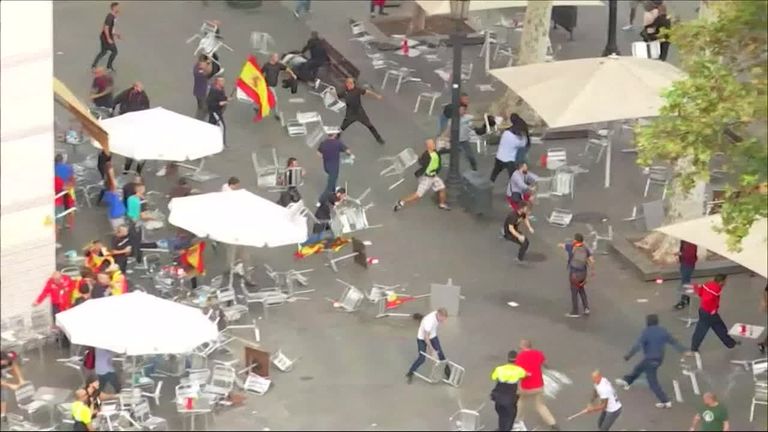Tension among students over Catalan independence
Intense rows break out outside lecture halls where those who back separating from Spain pile furniture against doorways.
Thursday 26 October 2017 12:43, UK
At the University of Barcelona the tensions surrounding Catalan independence have pitted students against one another.
Intense rows broke out outside lecture halls where those who back separating from Spain piled furniture against doorways and manned access routes stopping people getting to their lectures as part of a three day "strike" to respond to the call for direct action.
The two sides screamed at one another with some students trying to push against doorways to get in.
One of the most angry was Laura Cabrera, who told us: "They say we have to stop classes and make noise so the people understand what is happening here.
"But I don't feel the same. I don't think you have to impose your opinion this way. This is not the solution and this is not an example to anyone."
Outside the same block the father of one student turned up and began shouting at the pro-independence group: "Look at you, you are behaving like fascists. Trying to force what a few want on the majority. That is fascism."
::
Fascists is what many who oppose independence say they have been called by separatists.
It is a word with particular resonance in a nation still .
But the strong language reflects heightened tensions as crunch time draws near for Catalonia and thousands are gearing up to respond when - as is expected - Spain moves to oust the Catalan government.
"I cannot just stay at home and watch", Oriol Collell tells me outside the Catalan parliament where there has been a call for a mass mobilisation of people on Friday.
That is the day the Spanish Senate is to vote on and expected to pass Article 155 for the constitution, which would impose direct control on the region.
Mr Collell tells me he will join with thousands to try and protect Catalonia's institutions and leaders by surrounding key buildings.
When I ask what he will do if the police tell him to move on, he says: "Arrest me. Yes. Why not?
I ask: "You are prepared to go to jail for it?"
::
He says: "Our force is our number. They don't have enough jails. What can they do? Open the stadiums of football to put prisoners inside?"
And he has a point.
Pro-independence marches in recent weeks have drawn hundreds of thousands of people.
If even a fraction of them turn out to try to block access to the Catalan leader Carles Puigdemont and his government then the police will face major difficulties.
The Spanish government, whilst being firm on the need to restore order and legality to the region, will want to avoid a repeat of the violent scenes on referendum day when the national police they sent in faced widespread criticism.
But an extra worry is how obedient the Catalan police - the "Mossos" - will be to orders from Spain.
If many of them defy instruction then it could add to a much feared tense environment.
What seems pretty much certain now is that there is little chance of any breakthrough politically.
Spain seems certain to push through with imposing direct control and the Catalan parliament seems certain to declare independence.
The Vice President of the Catalan parliament insists that Spain has given the separatists no choice but to "proclaim a new republic".
Both of those actions are certain to galvanise those who support separation from Spain.








